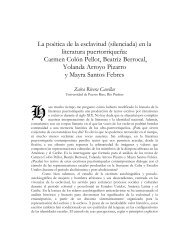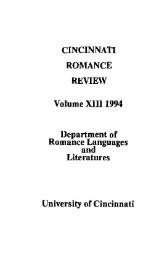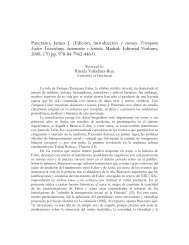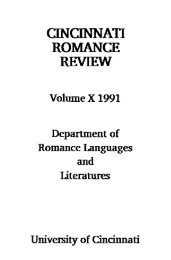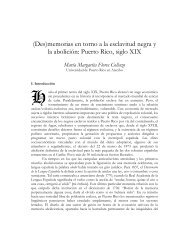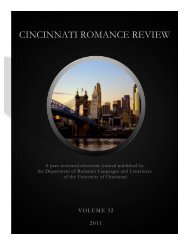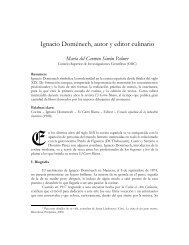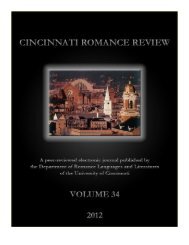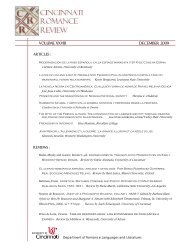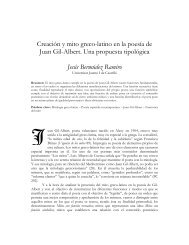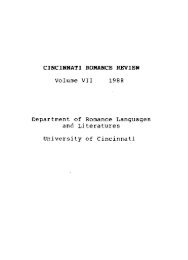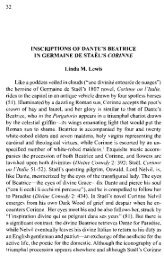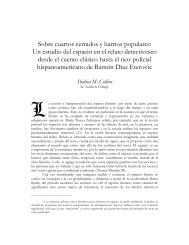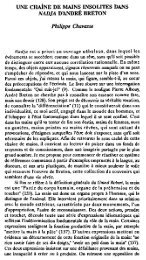Volume 30 (2011) - Cincinnati Romance Review
Volume 30 (2011) - Cincinnati Romance Review
Volume 30 (2011) - Cincinnati Romance Review
You also want an ePaper? Increase the reach of your titles
YUMPU automatically turns print PDFs into web optimized ePapers that Google loves.
“DOUBLE CONSCIOUSNESS/DOUBLE BIND” 73<br />
Burgos xxi). Moreover, as López Springfield and Esteves 2 have suggested, Julia de<br />
Burgos’s literary repertoire manifested a female poetics that deconstructed male<br />
conventions of the era and created a space for the female subject. The literary sphere<br />
afforded few opportunities to female writers during the early twentieth century in<br />
Puerto Rico. During the 19<strong>30</strong>s and 1940s many female writers subscribed to “male<br />
constructions of gender in order to be voiced” (López Springfield 56). Julia de Burgos's<br />
poetry rejects and contests these standard notions of gender by subverting and<br />
dismantling them.<br />
“A Julia de Burgos” is most likely the “first feminist manifesto written in<br />
Spanish by a woman of African descent” and openly defies societal norms (De Costa-<br />
Willis xxiii). The entire collection of Poema en veinte surcos “is that of a female voice who<br />
refuses to accept imposed societal roles” (Esteves 233). In “A Julia de Burgos,” the<br />
poet-speaker constructs an alter ego to deconstruct both male and female conventions<br />
of the era:<br />
Tú eres fría muñeca de mentira social,<br />
y yo, viril destello de la humana verdad.<br />
Tú, miel de cortesanas hipocresías; yo no;<br />
que en todos mis poemas desnudo el corazón.<br />
Tú eres como tu mundo, egoísta; yo no;<br />
que en todo me lo juego a ser lo que soy yo.<br />
Tú eres sólo la grave señora señorona;<br />
yo no; yo soy la vida, la fuerza, la mujer.<br />
Tú eres de tu marido, de tu amo; yo no;<br />
yo de nadie, o de todos, porque a todos, a todos,<br />
en mi limpio sentir y en mi pensar me doy. (2)<br />
There are two poetic voices in the poem including “you” or Julia and the poetic<br />
“I.” Julia dialogues with her moral conscious and unravels the pretentions that women<br />
are forced to adhere because of social conventions. The poetic voice “you” represents<br />
social lies, hypocrisy, selfishness, appearances, and the conventions of society and<br />
stands in opposition to the poetic “I” which symbolizes everything that the former is<br />
not. The poetic “I” exudes essence, human truth, individuality, strength, and honesty.<br />
The poet-speaker “I”indicates, “Tú eres fría muñeca de mentira social/y yo, viril<br />
destello de la humana verdad” (2). The poet-speaker notes that neither option is viable<br />
for the woman of early twentieth-century Puerto Rico. While “you” possesses<br />
everything, she must sacrifice her integrity and authority to obtain it. Additionally, she<br />
______________________<br />
2 In “Julia de Burgos: Woman, Poet, Legend” Carmen Esteves analyzes the feminist aspect of de<br />
Burgos's poetry and her refusal to “accept imposed societal roles” (233).<br />
<strong>Cincinnati</strong> <strong>Romance</strong> <strong>Review</strong> <strong>30</strong> (Winter <strong>2011</strong>): 69-82.



